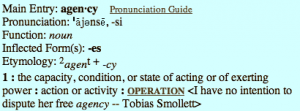
Even tiny tots have their own ideas. Give kids and your employees the space to make their own decisions.
What is “agency”?
You have it. Your kids have it as soon as they’re born. Even your employees have it (don’t worry, it isn’t their local recruiting office).
“Agency” is a short yet fancy word for “decision-implementing capability.” An individual has agency if she has the power to change her mind or take action. Even the tiniest of human babies have some rudimentary level of agency.
In academia, agency is a touchy subject. Questions about consciousness and when actions are intended or made from instinct are typical areas of study for some Developmental, Evolutionary or Behavioral Psychologists. These scholars concentrate on an individual’s agency and how it emerges in the human life cycle. Philosophers of the “I think therefore I am” Descartes variety debate the very existence of agency in humans and animals.
Different beliefs about agency are also evident in parenting styles. Some parents are strong authoritarians who believe small children do not have the knowledge needed to make good choices. In contrast, permissive parents give their children’s budding motivations the utmost importance. Employers can fall into these extremes, too, swaying between micro-managing and a leaderless, hands-off approach.
Neither extreme works well. Too much authority can rob people of motivation. Too little leadership may cause people to lose focus. A happy balance between the two extremes can make your workplace or your home life run a bit more smoothly.
In his book, Drive: the Surprising Truth about What Motivates Us, Daniel Pink puts forth a theory that people need autonomy, mastery and purpose in any endeavor in order to stay motivated and achieve goals. Autonomy, mastery, and purpose fall under an individual’s agency. In the workplace, this translates into managers giving employees the tools they need to 1. work individually in an environment of trust (autonomy), 2. be able to constantly improve their skills (mastery) and 3. function as a part of a larger system for the greater good (purpose). Take away any of these aspects, and you’ll see your employee morale go down and your turnover rates increase.
Parenting is similar. We strive to give our children the tools they need to become adults, but along the way many children aren’t given the space and time to master those tools. Paul Tough’s book How Children Succeed, a look at how to get lower-income, underserved kids to success by inculcating good character traits, has elicited a loud rallying cry from many middle-class and elite educators who claim parents are failing by not allowing their kids to suffer the consequences of poor decisions. Over-protective “helicopter parents” jump in to solve all their child’s problems and erase any growth opportunity for the child. (Here’s an egregious example: At a nearby high school, parents have been known to bring lawyers along to teacher’s conferences to dispute their child’s grades!) This overzealous protection results in dependent, confidence-lacking young adults that fail to launch.
At work and at home, you can strike a healthy balance between overbearing leadership and reckless free reign. Determine just how much agency your charges (i.e., your children or employees) have in relation to their tasks. When assigning a new responsibility, ask yourself 3 preliminary questions:
- Do others in this situation accomplish this task? (compare your charge to her peers)
- Does this person have the tools to accomplish this task? (check her resources and talents)
- What will happen if this person fails at this task? Is the danger perceived or real?
If you are comfortable with the answers, make a plan and implement it. Give your people room to grow by giving them the tools to exercise their own agency in a productive way. Your children or your employees will always have their own agency, because there are as many opinions as there are people in the world. You want to provide an environment where everyone understands the goals and are motivated to use their agency, i.e. make decisions, that help achieve those goals.
Have you ever heard the term agency before? What words do you use to describe this phenomenon of personal motivation? Let’s discuss.

